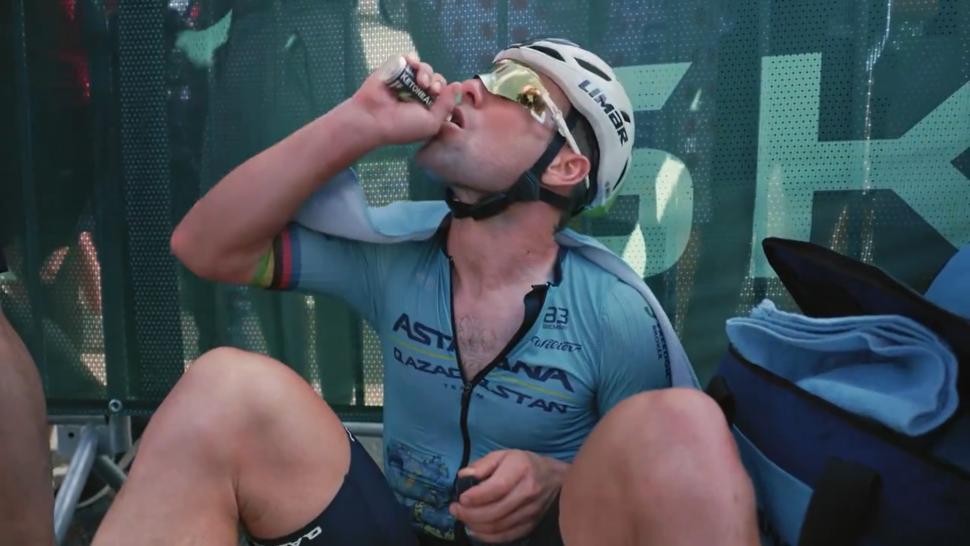Supplement brands who provide ketone products to the world’s best cyclists have come out fighting after the UCI released a statement recommending riders avoid ketones as there is “no compelling evidence” they boost performance or recovery.
Yesterday, the UCI took the interesting step of releasing an official statement on ketone use in cycling. The governing body stated that while the supplements will not be banned, the recommendation was for teams and riders to avoid them, the UCI taking the stance that there is no scientific evidence to support their use.
Responding to the claims, the CEO of Visma-Lease a Bike’s partner Ketone-IQ said he “respectfully disagrees”, while the CEO of Astana-Qazaqstan and Soudal Quick-Step’s supplier KetoneAid called the UCI intervention “puzzling”.
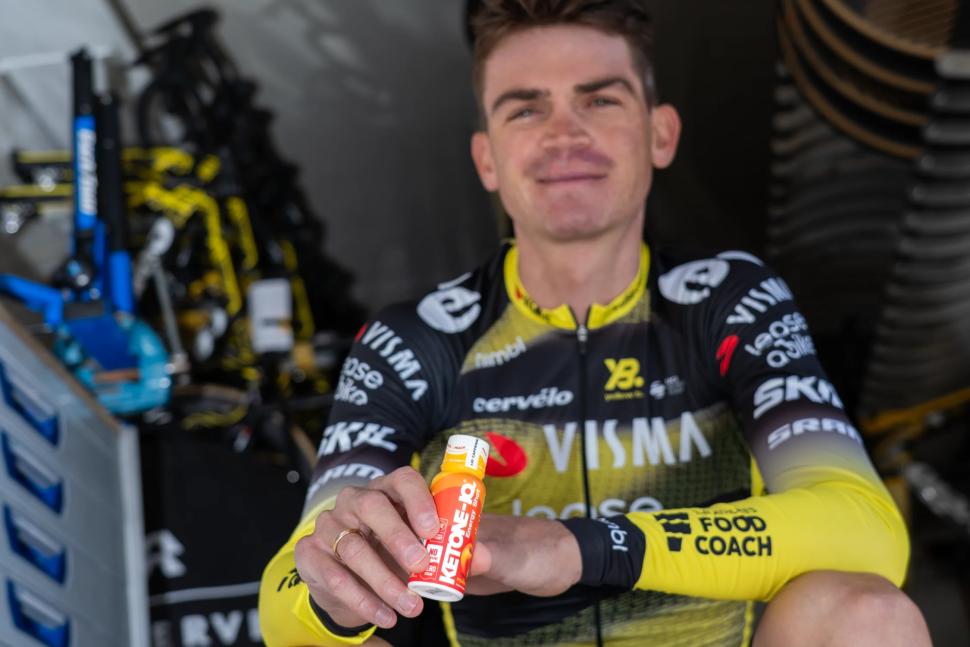 Sepp Kuss and Visma-Lease a Bike ketone product (credit: Ketone-IQ)
Sepp Kuss and Visma-Lease a Bike ketone product (credit: Ketone-IQ)
Ketones are a chemical compound produced naturally in the body, used during exercise when glucose is in short supply. However, there are also ketone supplements which have become a regular sight at the biggest races on the calendar, riders often seen quickly drinking a small bottle of liquid at the finish of Grand Tour stages. Riders and supplement brands have spoken regularly about ketones boosting recovery, with numerous teams having official ketone partners or sponsors.
Frank Llosa CEO KetoneAid, the brand which provides ketone supplements to WorldTour teams Soudal Quick-Step and Astana Qazaqstan, questioned the need for the UCI to express an opinion on ketones and asked if the governing body would now be taking a stance on a whole range of other nutrition and supplementation products.
“What’s puzzling is why the UCI feels the need to issue recommendations about something it claims doesn’t work,” Llosa told road.cc. “If ketones are safe and ineffective, why not let riders make their own choices? When Remco wants to use them between Olympic events because he feels they help his recovery, why should the UCI care?
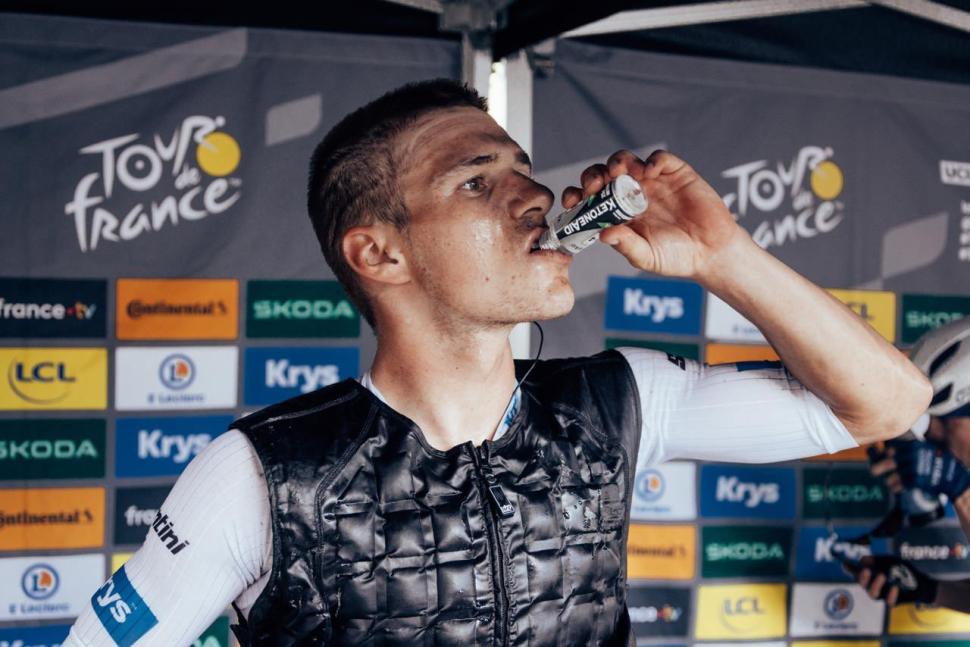 Remco Evenepoel uses ketone supplement at 2024 Tour de France (credit: Wout Beel/Soudal Quick-Step)
Remco Evenepoel uses ketone supplement at 2024 Tour de France (credit: Wout Beel/Soudal Quick-Step)
“And if we’re issuing guidance on supplements without performance benefits – are we expecting position papers on cherry juice next? What about M&Ms now that they’re sponsoring the Tour?”
Soudal Quick-Step is pleased to announce the continuation of its successful partnership with @ketoneaid, the world leader in ketone fuelling for athletic performance 🙌 pic.twitter.com/hotZl5qtSf
— Soudal Quick-Step Pro Cycling Team (@soudalquickstep) May 16, 2025
KetoneAid’s CEO also wants to ask the UCI to cite the studies it referenced in the statement, yesterday’s press release mentioning “the results of a very comprehensive, high-quality study” that “show taking ketones after competition or high-intensity training sessions has no effect on the quality of recovery”.
“The statement mentions ‘a very comprehensive, high-quality study’ but doesn’t cite it,” Llosa continued. “Meanwhile, the Poffé 2021 study in Medicine & Science in Sports & Exercise showed significant recovery benefits, as high as 15 per cent next day more watts. Did they read it differently? Hard to say when they don’t tell us which study they’re referencing.”
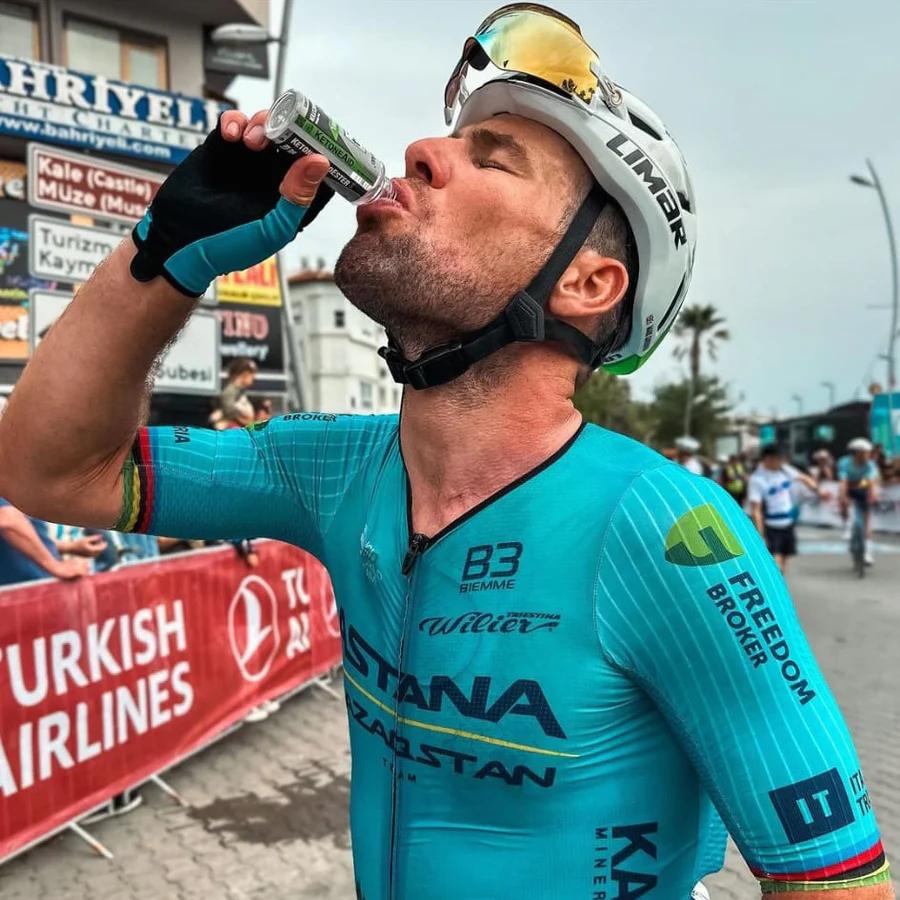 Mark Cavendish using KetoneAid supplement (credit: KetoneAid)
Mark Cavendish using KetoneAid supplement (credit: KetoneAid)
He concluded by telling us that the “good news” is that the UCI’s “original concern on ketones was safety, and this statement doesn’t mention that at all”.
“So I guess we can assume the safety issue has been resolved,” he said. “The best performance nutritionists understand ketones, let them do their job.”
Fellow ketone supplement brand Ketone-IQ also supplies WorldTour riders with its products, the company having a partnership with Visma-Lease a Bike.
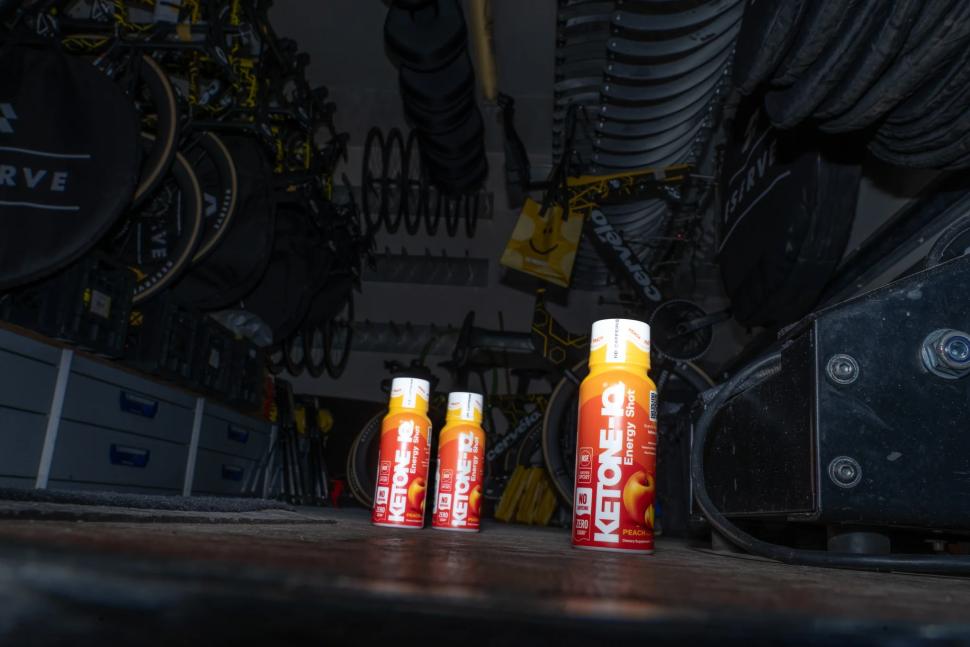 Visma-Lease a Bike ketone partner (credit: Ketone IQ)
Visma-Lease a Bike ketone partner (credit: Ketone IQ)
Michael Brandt, Ketone-IQ’s CEO and co-founder said he “respectfully disagrees” with the UCI’s judgement that the supplements do not boost performance or recovery.
“We have robust data from our partnership with Visma-Lease a Bike that Ketone-IQ helps with a number of relevant biomarkers, similar to the training benefits of altitude training,” he told us.
“Our stance continues to be that measures — nutrition or otherwise — that improve rider performance with little or no downside should be unequivocally allowed. I put altitude training, innovation on carbohydrate formulation, and ketones all together among other measures in this category. Healthier, stronger riders are safer riders, which is a win for the entire sport.”
Brandt’s company has done some research of its own, a study in collaboration with the human performance research institute at KU Leuven suggesting Ketone-IQ’s product delivered measurable improvements in EPO, angiogenesis and vascular function.
This, they say, would mean more red blood cells to carry oxygen, new red blood vessel formation, and faster blood transport through existing blood vessels. The data from the study is under review, Brandt hoping it will be fully published soon.
> UCI tells riders to avoid ketones as “no compelling evidence” they enhance performance or recovery
Some have expressed surprise with the tone of the UCI’s statement, the governing body issuing a press release about a product which is legal and does not, as far as anyone is aware, have any safety implications.
The UCI said research has “contradicted earlier findings” that ketones “were found to have added value in terms of the speed of muscle glycogen resynthesis and endogenous EPO production”, a claim repeated in Ketone-IQ’s recent research.
“The results of a very comprehensive, high-quality study show that taking ketones after competition or high-intensity training sessions has no effect on the quality of recovery,” the UCI statement concluded.
“As there is no compelling evidence that ketone supplements enhance performance or recovery, the UCI sees no reason for them to be used. Therefore, the UCI does not recommend the inclusion of such supplements in riders’ nutritional plans.”
